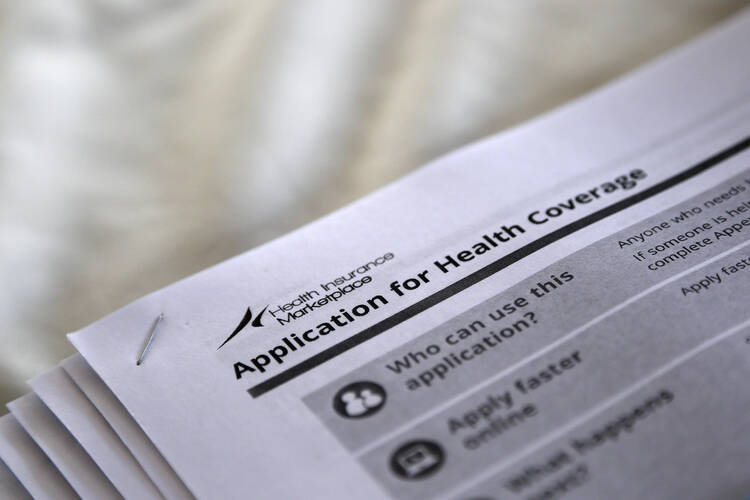So Washington has come up with a news story even more protracted and complex than the government shutdown and default threat of October. It’s going to take me all weekend to catch up on all the developments on the implementation of the Affordable Care Act (“Obamacare”), which means I won’t get any exercise and will die before I can use more than my fair share of Medicare benefits.
The Washington Post has great explainers on President Obama's proposed fixes and congressional proposals. But here’s the gist. The most popular feature of the Affordable Care Act (a ban on insurance companies denying coverage to individuals with pre-existing medical problems) is incompatible with the most popular fix to the Affordable Care Act (allowing individuals to keep bare-bones policies with relatively cheap premiums). That’s because cheap insurance policies can keep premiums low in part by denying coverage to individuals with pre-existing medical problems.
So all the proposals to preserve these cheap policies—which are mostly junk policies because they don’t cover anything or exclusionary policies because they keep out the old and sick—may be unworkable. If we had the single-payer health insurance system that conservatives fought so hard to avoid, I suppose Congress could just force the government to keep premiums low for the young and healthy. (It would be like forcing the U.S. Post Office to keep stamps low enough to ensure unprofitability or forcing Amtrak to run unprofitable passenger rail routes. No biggie.) But Obamacare relies on private insurance companies, and neither Democrats nor Republicans have an ideologically sound reason to force them to lose money by freezing low premiums for healthy people even as the law now requires them to sell policies to people with pre-existing conditions who are more likely to file claims.
But there may be a bad solution to cut the financial risk for insurance companies now forced to take on sick people as customers. Here is Reason’s J.D. Tuccille (mentioned in this blog before) on a possible free-market fix to this mess:
John C. Goodman and Peter Ferrara of the National Center for Public Policy Analysis […] propose giving people uniform tax credits to purchase health insurance. Once again, that approach would give individuals more control over their health expenditures, since they wouldn’t be bound by employers’ choice of insurers. It would also be more equitable, since current employer-based tax breaks vary widely depending on workers’ income.
Goodman and Ferrara also want to “guarantee renewability” to address the problem of people being dropped by insurers. And they propose a safety net, funded up to the level of unclaimed tax credits, to cover the less-than-proactive segments of the population.
The phrase that strikes me there is “guarantee renewability,” which is not the same as guaranteeing access to health insurance for all. It reminds me of Mitt Romney’s proposed policy, stated in a 2008 USA Today column called “Why I’d repeal Obamacare” (emphasis mine):
To the extent that we have any federal regulation, it should focus on helping markets work. Thus, to take one much discussed problem, individuals with pre-existing conditions who have maintained continuous health insurance coverage should be guaranteed the ability to retain coverage.
Politifact covered this in more detail when it rated “mostly false” Romney’s claim in the first presidential debate that “pre-existing conditions are covered under my plan.” In that debate, Barack Obama countered with:
“What your plan does is to duplicate what’s already the law, which says if you are out of health insurance for three months, then you can end up getting continuous coverage and an insurance company can’t deny you if it’s been under 90 days. But that’s already the law, and that doesn’t help the millions of people out there with pre-existing conditions.”
I admit this is a dog that hasn’t yet barked this year. But I’m keeping an eye on it because driving a wedge between individuals who have continuously paid for insurance and those who have skipped more than three months for economic reasons (like having to pay for food and rent first—the deadbeats) might work as a political strategy, and it would ease some pressure on the insurance industry.
Ted Cruz, the Republican senator from Texas who tried using the government shutdown as a way of defunding Obamacare, implicitly (if perhaps facetiously) endorsed this strategy in an interview with Fox News’s Chris Wallace (via Dave Wiegel):
[…] toward the end, Wallace pressed Cruz on what Republicans could offer the uninsured. They had not, he pointed out, done anything that would cover the teeming masses of those without health insurance.
“It would have been simpler to send them a check, rather than messing up the health care of millions of Americans,” said Cruz.
Tax credits and vouchers would not have helped individuals with pre-existing conditions who had been priced out of the market for more than three months (and didn’t get insurance through employers). Presumably, such individuals would have to apply for Medicaid (which many Republican governors are refusing to expand even with federal assistance) or hope to survive until they’re old enough for Medicare.
Unfortunately, the big story this month involves people buying health insurance through the individual market who now face the possibility of increased premiums—as opposed to the people who have been blocked from getting decent insurance and are now getting a way to access it (if, it must be admitted, the enrollment websites finally become usable).








